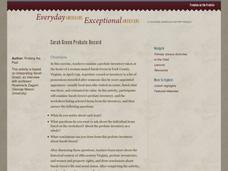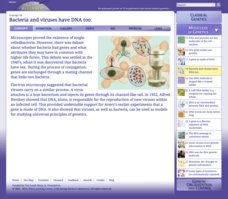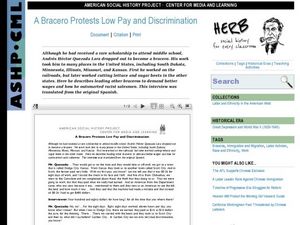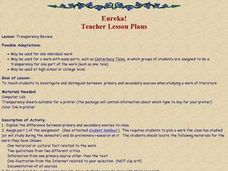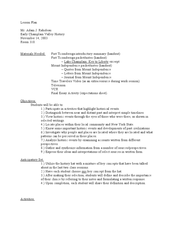Historical Thinking Matters
Rosa Parks: 1 Day Lesson
You've heard of the historical moment when Rosa Parks refused to give up her seat on a bus, but did you know that some historical accounts disagree on where she sat? Investigate this query with your young historians, and practice...
Curated OER
A Colony is Born : Lesson 5 - Dear Mem
Discover colonies! Young historians will listen to a primary source journal entry read aloud with a backdrop of wave sounds. They discuss the entry, add historical facts to a chart and personal insights to another. Then they listen to...
National Endowment for the Humanities
Revolution '67, Lesson 2: What Happened in July 1967? How Do We Know?
Even in a world in which dozens of participants and curious onlookers record every controversial event, the basic facts of what happened are often in dispute. Revolution '67, Lesson 2 explores 1967 Newark, New Jersey using an examination...
Crabtree Publishing
The Genius of the Ancients
It is said that necessity is the mother of invention. Fifth graders prove this with help from three lessons that examine how ancient cultures used their needs to drive innovations. In lesson one, pupils identify main ideas and supporting...
Library of Congress
Women's Suffrage Movement Across America
An engaging resource provides many primary source materials to inform a study of the Women's Suffrage Movement. Suggestions include building a timeline of the fight, using the documents as the basis of a DBQ, and/or using a Venn diagram...
Curated OER
Current Event Project
One of the best ways to make history relevant and engaging is to analyze current events before they become history! Check out these project guidelines for a current event research paper, outlining the major required sections of the...
Roy Rosenzweig Center for History and New Media
Sarah Green Probate Record
The proof is in the probate record. Much can be learned about history by investigating old, primary source documents. Class members hone their detective skills by examing the 1759 probate record of Sarah Green. Who was this lady? Was she...
Green Hope High School
Close Readings from The Tempest + New World Readings
What was Shakespeare's intent? That is the question at the heart of a summer assignment designed for AP English Literature. Class members focus on five scenes from The Tempest and compare the interactions of Prospero, Caliban, and...
Annenberg Foundation
Postwar Tension and Triumph
Go get the American Dream lifestyle! The 19th lesson in a 22-part series exploring American history shows learners the post-WWII economic boom. Using primary sources, photographs, and cartoons, groups discuss their findings and present...
National Endowment for the Humanities
A Journalist’s Report: The Better Vision for Black Americans
After reading a series of primary source documents detailing the teachings of Martin Luther King, Jr. and Malcolm X, class members craft newspaper columns assessing the strengths and weaknesses of each man's vision, and present their...
Cold Spring Harbor Laboratory
Bacteria and Viruses Have DNA Too
In the 1940s, scientists discovered bacteria conjugation, the process of DNA transfer or bacterial sex. The discovery proved that bacteria and viruses contain DNA and led to a Nobel prize. Interested individuals learn about the...
Curated OER
Adding to the Picture: The 1963 March on Washington
Who do your scholars imagine when they think about the civil rights movement? If only a few faces come to mind, this lesson will expand their concepts of the movement's leaders. Learners examine an image of the 1963 March on Washington,...
Curated OER
A Bracero Protests Low Pay and Discrimination
In this primary source analysis activity, students analyze an interview with a bracero. Students respond to 3 short answer questions based on the interview.
Curated OER
President Roosevelt Seeks Feedback on New Deal Programs
In this primary source analysis worksheet, students analyze a letter from President Roosevelt to clergymen regarding New Deal programs. Students respond to 1 short answer question about the letter.
Curated OER
A Bracero Compares Expectations versus Reality of Life in the United States
In this primary source analysis worksheet, learners analyze an interview with a bracero who describes the expectations and realities of life in the United States. Students respond to 3 short answer questions based on the interview.
Curated OER
Transparency Review
Students investigate and distinguish between primary and secondary sources when analyzing works of literature. They present their information on transparencies that are displayed to the class.
Humanities Texas
A President's Vision: Franklin D. Roosevelt
This poster goes well beyond any traditional worksheet in allowing learners to analyze a variety of primary source documents related to the presidency of Franklin D. Roosevelt.
Curated OER
Early Champlain Valley History
Class members use primary sources to craft an essay about early Champlain Valley History. I would use this as a homework assignment.
Syracuse University
American Industrial Revolution
While the Industrial Revolution may have fueled America's rise to the top of world markets, the child laborers often faced dangerous conditions. Using primary source images and other information, scholars consider what these children...
Jamestown-Yorktown Foundation
Making a Patriot Inquiry: Are Independence, Freedom, and Liberty the Same Thing?
As part of a study of the American Revolution, class members engage in an inquiry-based lesson that has them watch a scene from the play Slave Spy, examine multiple primary source documents, and then discuss the similarities and...
Stanford University
Hurricane Katrina
The adage says that journalism is the first draft of history. How should people evaluate these sources of information? Taking into account various sources, including those from various perspectives and different creators, learners...
K20 LEARN
Give Me Liberty or Give Me Death: The Journey to Revolution
The words of "Common Sense" and Patrick Henry's "Give me liberty or give me death!" speech ring throughout history. Scholars explore the nuances of each patriot's argument using excerpts from the famous pamphlet and speech and a recorded...
Center for History Education
Women's Rights in the American Century
Today, many young people find it hard to understand why it took over 150 years for women in the United States to get the right to vote—why there was even a need for the suffrage movement. As they read a series of primary source...
US National Archives
WWII: Western Europe 1939-45 – Occupation
Warsaw, Poland, suffered much of the blunt of World War II—but according to Polish letters from the early days of Nazi occupation, other parts of the country were much worse off. High schoolers use the letters and contemporaneous...








